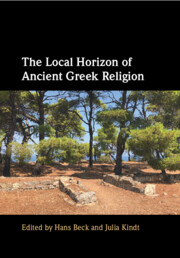Book contents
- The Local Horizon of Ancient Greek Religion
- The Local Horizon of Ancient Greek Religion
- Copyright page
- Contents
- Figures
- Contributors
- Preface
- Abbreviations
- 1 Localism and the Study of Ancient Greek Religion: The Example of the Divine Persona
- 2 Refitting the Local Horizon of Ancient Greek Religion (Including Some Remarks on the Sanctuary of Poseidon on Kalaureia)
- 3 Mycenaean Greek Worship in Minoan Territory
- 4 Hera on Samos: Between the Global and the Local
- 5 Polytheism and the Distribution of Votives in the Corinthia
- 6 Demeter Chthonia at Hermione: Landscapes and Cult
- 7 Local Variation in the Thesmophoria Festival: A Case Study of the Attic and Sicilian Thesmophoria Festivals
- 8 The Lindian Chronicle and Local Identity
- 9 Shifting Identities and Defensive Localism: Conflicts of Religious Narratives in Post-Synoikism Rhodes
- 10 Between Local and Global? Religion in Late-Hellenistic Delos
- 11 Personal or Communal? Social Horizons of Local Greek Religion
- 12 How to Write a Local History of Imperial Greek Cults: Observations from Pausanias
- 13 Panhellenic Sanctuaries: Local and Regional Perspectives
- Epilogue: A Tribute to Potnia of the Labyrinth
- Index
12 - How to Write a Local History of Imperial Greek Cults: Observations from Pausanias
Published online by Cambridge University Press: 06 April 2023
- The Local Horizon of Ancient Greek Religion
- The Local Horizon of Ancient Greek Religion
- Copyright page
- Contents
- Figures
- Contributors
- Preface
- Abbreviations
- 1 Localism and the Study of Ancient Greek Religion: The Example of the Divine Persona
- 2 Refitting the Local Horizon of Ancient Greek Religion (Including Some Remarks on the Sanctuary of Poseidon on Kalaureia)
- 3 Mycenaean Greek Worship in Minoan Territory
- 4 Hera on Samos: Between the Global and the Local
- 5 Polytheism and the Distribution of Votives in the Corinthia
- 6 Demeter Chthonia at Hermione: Landscapes and Cult
- 7 Local Variation in the Thesmophoria Festival: A Case Study of the Attic and Sicilian Thesmophoria Festivals
- 8 The Lindian Chronicle and Local Identity
- 9 Shifting Identities and Defensive Localism: Conflicts of Religious Narratives in Post-Synoikism Rhodes
- 10 Between Local and Global? Religion in Late-Hellenistic Delos
- 11 Personal or Communal? Social Horizons of Local Greek Religion
- 12 How to Write a Local History of Imperial Greek Cults: Observations from Pausanias
- 13 Panhellenic Sanctuaries: Local and Regional Perspectives
- Epilogue: A Tribute to Potnia of the Labyrinth
- Index
Summary
This chapter alerts readers of the shortcomings of a mining approach to Pausanias’ Periegesis as a prime evidence for the study of local religion in ancient Greece. The question of where local specificities are discussed in the narrative is as critical as the actual information conveyed. The chapter speaks to the analytical challenge of interpreting a narrative that is, on the one hand, reflective of the non-linear and essentially decentralised nature of the local, yet on the other filters this nature through the linear rigours of writing. Starting from fleeting experiences of the local, highly subjective to the individual that makes them, Hawes turns to an exemplary discussion of Argos, Thebes, and Messenia that exposes the mechanics of a scripted localism, a literary approximation to place. The discussion of Pausanias’ localistic perspective extends to the narrative technique of cross references and to instances where such connections were deliberately denied: the case in point being Pausanias’ treatment of the notorious problem of the location of Homeric Pylos.
- Type
- Chapter
- Information
- The Local Horizon of Ancient Greek Religion , pp. 342 - 361Publisher: Cambridge University PressPrint publication year: 2023

